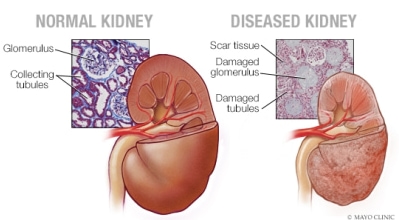


One of the conditions associated with WAGR syndrome is a type of chronic kidney disease called Focal Segmental Glomerulosclerosis or FSGS. Approximately 60 percent of individuals with WAGR syndrome develop FSGS at some point in their lives, most often during adolescence or early adulthood.
Why FSGS develops in patients with WAGR syndrome is unclear, but the primary reason is thought to involve deletion of the WT1 gene. This gene is critical to development and function of specialized cells called podocytes, which are part of the filtering system of the kidney. People with WAGR syndrome have only one copy of the WT1 gene.
Early symptoms of FSGS include
FSGS is often progressive. This means that it may lead to decreasing kidney function, and ultimately to kidney failure. Kidney failure is a condition that must be treated with either dialysis or kidney transplant.
Early detection of FSGS in individuals with WAGR syndrome is very important. Starting treatment soon after diagnosis can prolong the time between diagnosis and the need for dialysis or kidney transplant--in some cases for many years.
Printable Information Sheet
Focal Segmental Glomerulosclerosis is a disease in which scar tissue develops in the parts of the kidney that filter waste from the blood. These filtering parts are called the glomeruli. In the early stages of FSGS, scarring (sclerosis) only takes place in small (focal) sections of each glomerulus, and only a limited number of glomeruli are damaged at first (segmental).

Normal vs. Diseased Kidney
Kidneys contain millions of glomeruli. These filters work like a sieve or colander. Blood flows through them as it circulates through the kidney, and waste products in the water-like part of the blood drain through. This fluid becomes urine. Other parts of the blood, such as proteins, are strained out and stay in the blood.
When glomeruli are scarred, they do not filter properly. They begin to allow proteins from the blood to "spill" into the urine. As FSGS progresses, more of the glomeruli become scarred, filtering worsens, and the kidney loses its ability to manage waste and excess fluid.
Regular screening for FSGS should begin at birth and continue throughout life. Screening tests include
Abnormalities in these tests should prompt further investigation and consideration of referral to a nephrologist (doctor who specializes in diseases of the kidney).
NOTE Kidney biopsy to confirm the diagnosis of FSGS is not routinely recommended in patients with WAGR syndrome. FSGS is well-established as the cause of chronic kidney disease in this disorder, and many patients with WAGR syndrome have either a solitary kidney or are post partial nephrectomy due to treatment for Wilms tumor.
Treatment for FSGS should begin at the onset of high blood pressure or appearance of protein in the urine. Treatment for FSGS in patients with WAGR syndrome consists of
Sign up for News & Events
COPYRIGHT© 2025 IWSA / International WAGR Syndrome Association
